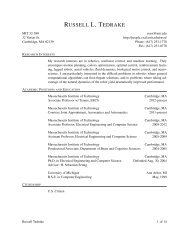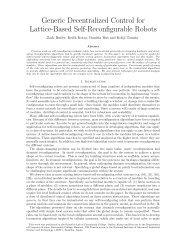Online Social Networks and E-Commerce - MIT Computer Science ...
Online Social Networks and E-Commerce - MIT Computer Science ...
Online Social Networks and E-Commerce - MIT Computer Science ...
You also want an ePaper? Increase the reach of your titles
YUMPU automatically turns print PDFs into web optimized ePapers that Google loves.
Clarence Lee <strong>and</strong> Shirley Fung<br />
data such as search query terms <strong>and</strong> browsing history to better improve the price point <strong>and</strong> also product<br />
selection of the store.<br />
<strong>Online</strong> advertisers such as DoubleClick have already started using the data to better target advertisement<br />
to increase sale of its clients. Amazon.com is one of the first online merchants to improve their advertising<br />
strategy by the use of collaborative filtering. Using the purchase history of the customers, Amazon.com<br />
shows suggestions for other products by the relation that others who have bought x also bought y.<br />
Amazon started its e-commerce business as an online bookstore, <strong>and</strong> has grown to be a store that sells<br />
items ranging from A to Z (as represented by its logo). Amazon also operates other online stores for<br />
retailers such as Target <strong>and</strong> Marks & Spencer.<br />
Traditionally, consumers have ways to shop without being tracked by visiting the physical store, <strong>and</strong> pay<br />
for their purchases with cash. With theses online retailers however, there is no longer an option to shop<br />
with privacy. Consumers are required to use a credit card for online transactions, <strong>and</strong> every click on the<br />
Web site (similar to every move you make in a store) is monitored <strong>and</strong> tracked. This raises some questions<br />
about how privacy should be protected in this new setting.<br />
Joint Services <strong>and</strong> Advantages for Marketers<br />
For marketers, having information from one Web site isn’t enough in the increasingly competitive world<br />
of e-commerce. Now, companies are interested in knowing what consumers do on Web sites besides their<br />
own. For instance, if Amazon knows what the consumer has listed as his/her favorite books <strong>and</strong> music<br />
artists on Facebook, it can better advertise for similar books <strong>and</strong> CDs on the consumer’s next visit to<br />
Amazon.com. Another example, if Amazon knows when your birthday is <strong>and</strong> who your friends are,<br />
Amazon can use that information to advertise gifts ideas to your network of friends.<br />
In these scenarios, some consumers find it intrusive that these businesses can know so much about them.<br />
Alternatively, when they visit one Web site, should they expect the information to stay within the<br />
company, <strong>and</strong> should never be passed on or sold to another party? There are currently no policies that<br />
would protect against these types of situations.<br />
Businesses now value all this information greatly, <strong>and</strong> are very interested in using it to improve their<br />
underst<strong>and</strong>ing of individual consumers. In order to make it easier to aggregate data streams, companies<br />
have started to provide platforms for integration. Both externally <strong>and</strong> internally, these companies began<br />
to diversify the kinds of services they provide on their Web site using these platforms. In November 2007,<br />
Facebook announced a new service called Facebook Beacon. The service allows a user to announce to<br />
others in their network about products or services he/she likes. Many online merchants have already<br />
signed on as a partner site through Facebook Beacon. Using Facebook Beacon, the users can endorse<br />
Page 9




![[ti]The “Vulgar Spirit of Blogging”: On Language, Culture ... - CSAIL](https://img.yumpu.com/18604217/1/190x245/tithe-vulgar-spirit-of-blogging-on-language-culture-csail.jpg?quality=85)











